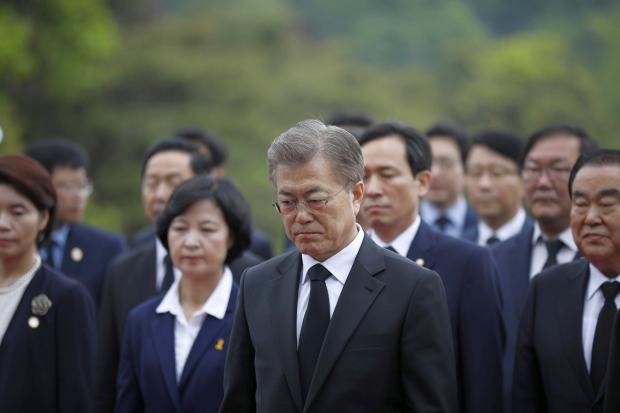Moon Jae-in, new president of South Korea, willing to visit rival North

New South Korean President Moon Jae-in (center) arrives at the National Cemetery in Seoul, South Korea Wednesday, May 10, 2017. Moon visited the national cemetery where he honored the country’s former presidents, independence fighters and war heroes as he began his presidential duties. (Pool photo by KIM HONG-JI via AP)
SEOUL—New South Korean President Moon Jae-in said on Wednesday that he was open to visiting rival North Korea under the right conditions to talk about Pyongyang’s aggressive pursuit of nuclear-tipped missiles.
Moon’s softer stance on Pyongyang could create friction with Washington, which has swung from threats of military action to hints of dialogue as it seeks to formulate a policy under President Donald Trump.
Moon, speaking during his oath of office as the first liberal leader in a decade, also said he would “sincerely negotiate” with the United States, Seoul’s top ally, and China, its top trading partner, over the contentious deployment of an advanced US missile-defense system in southern South Korea.
The system has angered Beijing, which says its powerful radars allow Washington to spy on its own military operations.
Peace on the peninsula
Article continues after this advertisementIn a speech at the National Assembly hours after being declared the winner of Tuesday’s election, Moon pledged to work for peace on the Korean Peninsula amid growing worry over the North’s expanding nuclear weapons and missiles program.
Article continues after this advertisement“I will quickly move to solve the crisis in national security. I am willing to go anywhere for the peace of the Korean Peninsula—if needed, I will fly immediately to Washington. I will go to Beijing, and I will go to Tokyo. If the conditions shape up, I will go to Pyongyang,” Moon said.
Moon, whose victory capped one of the most turbulent political stretches in the nation’s recent history, assumed presidential duties early in the morning after the National Election Commission finished counting and declared him winner of the special election necessitated by the ouster of conservative President Park Geun-hye.
He named former journalist Lee Nak-yon, a four-term lawmaker, as prime minister—a largely coordinating role—and appointed a new head of the National Intelligence Service, Suh Hoon, who played a key role in preparing the past two inter-Korea summits of 2000 and 2007.
Moon also named Im Jong-seok to be his chief of staff, the second most powerful position in a political system that concentrates authority in the president.
Moon thanked the millions of people who staged peaceful protests for months calling for the ouster of Park, who was impeached and arrested in March over a corruption scandal.
Message of unity
He also offered a message of unity to his political rivals—Moon’s Democratic Party has only 120 out of 300 seats in the National Assembly, so he may need broader support while pushing his key policies.
“Politics were turbulent [in the past several months], but our people showed greatness,” Moon said.
“In face of the impeachment and arrest of an incumbent president, our people opened the path toward the future for the Republic of Korea,” Moon said, referring to South Korea’s formal name.
To his rivals, Moon said, “We are partners who must lead a new Republic of Korea. We must put the days of fierce competition behind and hold hands marching forward.”
Taking up his role as the new commander in chief, Moon began his duties earlier in the day by receiving a call from Army Gen. Lee Sun-jin, chair of South Korea’s Joint Chiefs of Staff, who briefed him on the military’s preparedness against North Korea.
He then left his private residence in an emotional sendoff from hundreds of people and visited a national cemetery in Seoul.
After bowing to the former presidents, independence fighters and war heroes, Moon wrote in a visitor book: “A country worth being proud of; a strong and reliable president!”
He also visited the offices of opposition parties, seeking support in governing the country split along ideological lines and regional loyalties.
The leaders of China and Japan sent their congratulations.
South Korea’s relations with Japan are strained by the Japanese military’s sexual exploitation of South Korean women during World War II, and relations with China have been irritated over the deployment of the Thaad missile-defense system.
Moon made a campaign vow to reconsider Thaad.
Scandal-shaken nation
The son of refugees who fled North Korea during the war, Moon will lead a nation shaken by the scandal that felled Park, whose criminal trial is scheduled to start later this month.
Taking office without the usual two-month transition, Moon initially will have to depend on Park’s Cabinet ministers and aides, but he was expected to move quickly to replace them.
He will serve the typical single five-year term.
Moon was chief of staff for the last liberal president, the late Roh Moo-hyun, who sought closer ties with North Korea by setting up large-scale aid shipments and working on now stalled joint economic projects.
Winning 41 percent of the votes, he comfortably edged conservative Hong Joon-pyo and centrist Ahn Cheol-soo, who had 24 percent and 21 percent, respectively.
The conservative Hong had pitched himself as a “strongman,” described the election as a war between ideologies and questioned Moon’s patriotism.
Park’s trial on bribery, extortion and other corruption charges could send her to jail for life if she is convicted.
Dozens of high-profile figures, including Park’s longtime confidante, Choi Soon-sil, and Samsung’s de-facto leader, Lee Jae-yong, have been indicted along with Park. —REPORTS FROM AP AND AFP